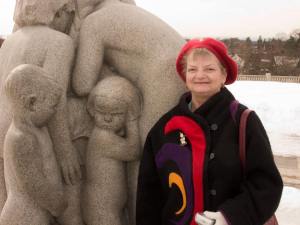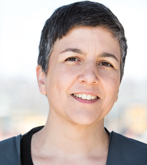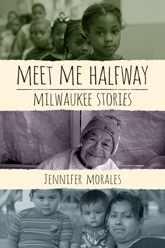Steven Handel, Distinguished Professor Emeritus of Ecology and Evolution, and editor of Ecological Restoration was recently awarded the LaGasse medal by the American Society of Landscape Architects (ASLA). This award “Recognizes notable contributions by individuals to the management and conservancy of natural resources and/or public landscapes.”
The LaGasse Medal is the highest honor the ASLA can award to a non-landscape architect professional. It represents the significant achievements Dr. Handel has made in nearly 40 years working in this field. With this award, Handel joins esteemed recipients including former Secretaries of the Interior Sally Jewell, and Bruce Babbitt. Handel’s medal will be given to him this Fall at the ASLA annual meeting.
The University of Wisconsin Press had the honor of interviewing Dr. Handel about his award. The transcription can be found below:
Congratulations on winning the prestigious LaGasse Medal! Can you tell me how you felt when you first learned about this recognition and what it means to you?
Steven Handel:
Well, I was called by the person who nominated me, and I was surprised, and I was really thrilled. It’s a national honor that only goes to one person in the United States each year, and I was just astonished. I worked very hard for a long time and most of the work of an academic is private. You know, you sit in your office, or in the field working and to realize that a huge professional organization gave me their highest honor for natural resources. I just was like a light went on in a dark room.
It was just wonderful and the people I work with, the landscape architects and so on were also just thrilled for me and said some very nice things. My son asked: “Is this the capstone of your career?” I said, well, I don’t know about that, but it certainly makes me feel that these last 20 years of work and designing public landscapes was appreciated, and I’m grateful for that.
The LaGasse Medal is awarded to individuals who have made significant contributions to the management and conservancy of natural resources and public landscapes. Could you elaborate on the contributions you were recognized for and what impact you believe these projects have had on the field as a whole?
Steven Handel:
That’s right. The nomination said I did 5 things that were worthy of this honor. One is I that I’ve managed the Rutgers Forest, which is an uncut primeval forest, one of the few left in the eastern US, and I helped save that from deer pressure and invasives, so formally helping a national natural landmark.
I’ve done writing, of course, for your journal Ecological Restoration, and also in the scientific literature on restoration, and bringing back natural biodiversity. I’ve done that for many years, many people read that, and I hope, respond to it.
A third, I’ve trained students, both undergraduate and graduate students, over 20 PhD’s and master students, over the years in restoration ecology. I’ve helped train the next generation, and I’ve lectured not only at Rutgers, but also at Harvard University in their Graduate School of Design, which is the biggest landscape architecture program in America. They invited me to give a required course to all their students. I did that for four years about using ecological principles in landscape design, and I hope that’s had an impression.
Finally, was helping to design public parks. I’ve worked with several leading landscape architecture companies to tweak or modify their designs to make them more ecological, more diverse, and more sustainable, and that’s been very interesting for me. Most of my life I worked with scientists, but here I was working with a very different profession of designers and landscape architects, so it’s a transdisciplinary collaboration. It’s so interesting to me that many of these people really listen to what I have to say and make their designs more biodiverse, and I hopefully more sustainable in a changing world.
What motivated you to pursue a career in the restoration of native plant communities and sustainability? Did you always have an interest in restoration work, or did your interest develop over time?
Steven Handel:
There was an actual moment where I decided I’d better look into this. I had spent about 20 years studying plant populations, how they spread, how they reproduce, pollination, seed dispersal and had a fine time.
That was sort of straight scientific population biology work, and one day I took my class out on a field trip and we went to an old landfill in New Jersey. It had been 25 years since they stopped dumping garbage there and at the top of the landfill were just a few weeds. Every textbook in biology says after 25 years of abandonment, you should get ecological succession. It should be perennial wildflowers and shrubs and young trees, and that did not happen on this landfill, and I said, why not? How is it possible to restore these 20 acres into a natural landscape? So I got a grant and we started doing some experiments there to find out why hadn’t it developed into a natural community.
That started this whole part of my career. We learned what some of the problems were and about four years later I got a call from a landscape architecture company. A big one. They said: “We’re doing a project and an old landfill. We heard you study landfills. Can you help us?” I started collaborating with them, and the next thing you know, I won the LaGasse Medal 20 years later.
Could you share some of the challenges or obstacles you encountered along your journey and how you overcame them?
Steven Handel:
Yes, so many people are interested in nature in the city greening American cities. But it’s hard, you know, cities are not Yellowstone National Park. They have many, many stresses and all those stresses have to be addressed using ecological scientific principles. Cities are hot because of traffic and buildings, and cities have fragmented landscapes, so each little bit of green land is surrounded by asphalt, not by other forests. Cities have a lot of invasive species, crummy soil because of past land uses, and each of these constraints has to be overcome to bring back biodiversity and healthy landscapes. Healthy for us, not just for birds and butterflies.
So we started learning what the constraints were, and what kinds of plants and what kind of protocols or processes to use. We had to bring back biodiversity, not what was there 400 years ago. Rather a biodiversity that could survive current stresses, in a climate which is changing rapidly, getting hotter and drier. So, it’s been very interesting as a study of applied ecology.
What are the problems? Well ecological links have to be used to address those problems, and you know, I have to work with landscape architects because they are the only ones with a license to do blueprints. I can’t do a blueprint, and also, they deal with all the other needs of a landscape: where people have to walk, where to put the restrooms, where to put the athletic fields, and I work on the spaces around that.
How can we make maximize ecological health? And my award is for trying to get landscape architects to do that, to add some ecological feature to every project they work on.
As a recipient of the LaGasse Medal, you join an esteemed group of individuals (including a former Secretary of the Interior) who have made significant contributions to the field. How does it feel to be recognized alongside such renowned figures?
Steven Handel:
A few of them even, including Bruce Babbitt, who was Secretary of the Interior for President Clinton. So, it’s amazing to read the list of names. Well, first I’ll say I think it’s an important recognition for my field more so than for me. The idea that ecology can play an important role in landscape design and that restoration ecology can partner with the design field. So, I think it’s a way of getting my field better seen, and I hope it will make more ecologists work with the design professions, architecture, and city planning.
For me personally, it just feels that people have appreciated all this hard work I’ve done. I once told your journal manager, Toni Gunnison, I work 50 to 60 hours a week, and I sometimes wonder if anybody even sees that. And so, I felt that it justified all that hard work after all these years.
The LaGasse Medal is a testament to your dedication and commitment to the restoration field. How do you envision the future of the field, and what are some of the emerging trends or challenges that you believe will shape it?
Steven Handel:
Well, that’s a good question. I think nationally people are finally getting to see the immediate impacts of climate change. I mean this horrible, polluted air that’s come down from the big forest fires in Canada, the rising sea levels at all of our coasts, the increased storms which are also part of climate change. People are desperate for solutions with these public problems. Restoration ecology and adding green solutions to the infrastructure are ways to help, so I’m hoping that people will see that ecological science is part of the solution for a healthier, more economically sustainable future for our country.
I completely agree. And the world?
Steven Handel:
One country at a time, my boy. Well, you know, just last week I got a call from a guy who’s a professor at Stockholm University in Sweden and he asked if I could come to Stockholm in September to help them in in a similar project. So, you know there is one international program that’s starting, and even the United Nations has gotten interested. They’re doing something now. They called this the Decade on Ecosystem Restoration and are trying to get other countries to realize adding back green solutions and natural solutions as part of protection. It’s for people, not just for butterflies and birds, and I stress that whenever I talk to a government group. By having healthy, sustainable infrastructure, it makes human health better, less asthma, less mental health stresses, and so on.
Lastly, what advice would you give to aspiring professionals in your field who hope to make similar significant contributions to the field?
Steven Handel:
Oh that’s good. I would say to my ecology colleagues and students: reach out to other disciplines. Science is fascinating, wonderful and makes great advances, but to make a better world, we have to reach out to other professions like landscape architects.
The old days of silos with each of us is in our own professional island, has to end, and the only way we’re really going to succeed to improve our country is for people with science backgrounds to work with public policy and the design communities. And they will welcome you.
One of my jobs at Harvard was to build links between biology and landscape architecture, and I think I succeeded a bit. Those kinds of academic and training links have to occur. I tell my ecology graduate students, get to know people in the design professions because you have so much to offer them.
And I think that is starting now nationally. I hope the LaGasse Medal is a recognition of that, and that we’ll get other landscape architects to think about working more closely with ecologists. There are some 15,000 members of the American Society of Landscape Architects and they all will get the news release about this medal and I hope it will make them think to reach out to a local university or ecology group to have them partner in new landscape designs.










